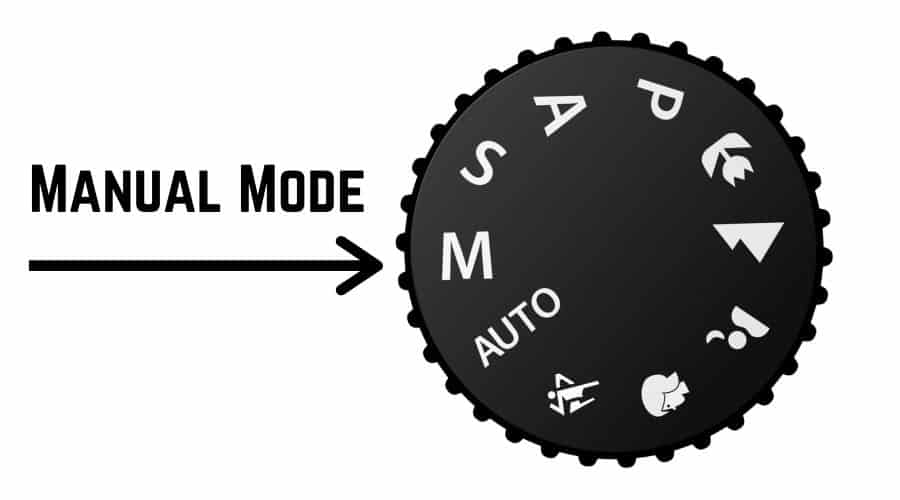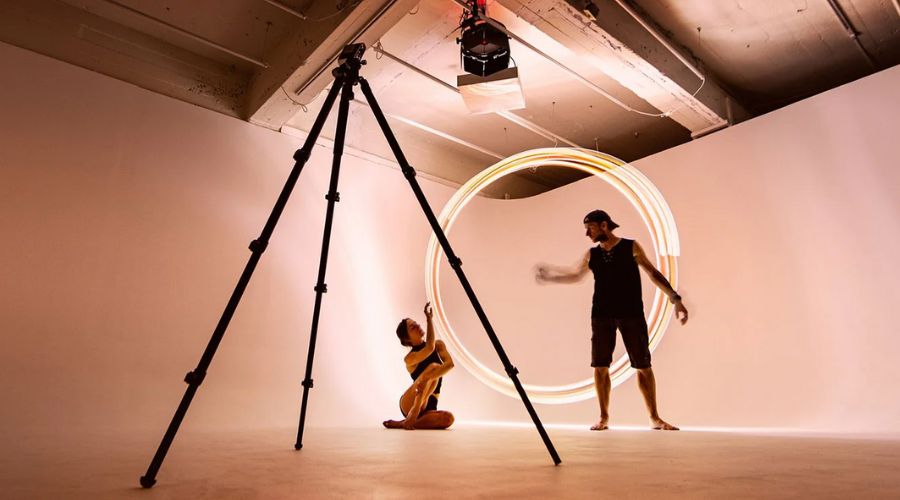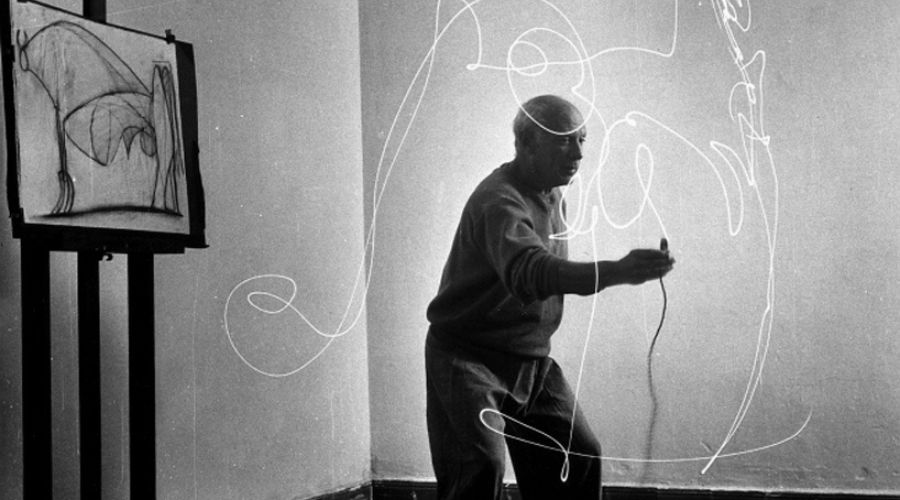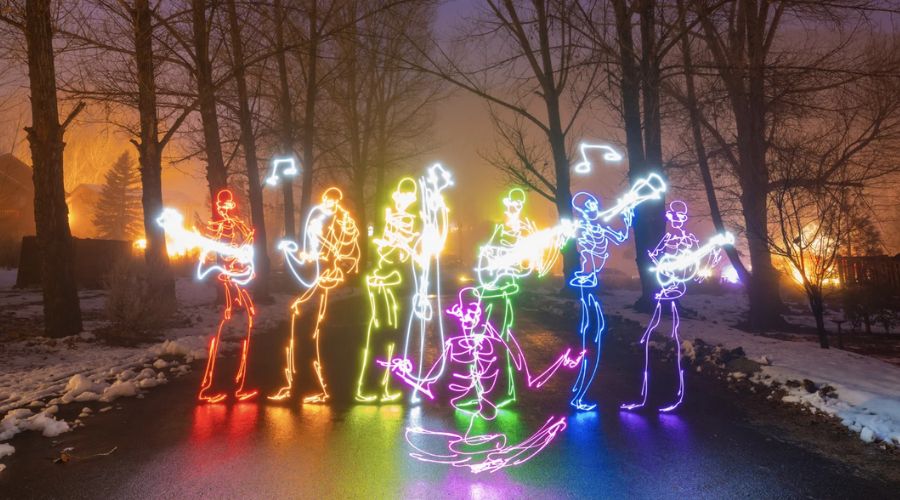Graffiti photography is like the cool cousin of regular photography but with a twist. Think of it as painting with light in the dark, creating a kaleidoscope of colors that dance in the night.
Get ready to give your Instagram a facelift because you’re about to learn how to create impressive light graffiti photography.
Now, keep your britches on, because this isn’t rocket science. Nope, it’s simpler than baking a pie, and way more fun.
Light graffiti doesn’t need you to be Picasso or Banksy; it’s all about letting loose and having a blast with a camera and some lights.
Just imagine waving a wand and boom, you’ve got magic—except your wand is a flashlight, and your spellbinding charm is a long exposure.
Sounds cool, right?
Let’s put on our adventure hats and jump into the world of light graffiti photography. It’s a place where your imagination is the limit, and the only rule is to have fun.
Tools and Equipment for Creating Light Graffiti
Choosing the Right Light Sources
Picking a light source is like choosing your paintbrush.
Did you know that even an ordinary flashlight can be your magic wand for light graffiti?
Prefer something with a bit more pizzazz? LED lights, glow sticks or even your smartphone’s light can get the job done. Just think bright and portable.
Essential Camera Settings for Capturing Light Graffiti
Have a camera? Great. Now, it’s time to tweak those settings.

Flip your mode to manual; this isn’t a time for auto-pilot. You’ll want a slow shutter speed—think, “sloths on a lazy river” slow.
Set your ISO low to avoid grainy “noisy” photos and aperture to around f/8 for a sharp focus.
Additional Accessories for Light Painting
If you’re feeling fancy, grab a tripod.
Why?
Because shaky hands make for blurry trails, and we don’t want an abstract mess. A remote shutter release is also a lifesaver; it keeps your camera still as a statue while you dance around with lights.

Now that you’re equipped and ready, go out there, flip the switch, strike a light pose, and let the night be your canvas. Make your light doodles the envy of the block!
Step-by-Step Guide to Making Light Graffiti
Now imagine wielding light like a paintbrush and night as your canvas; you’re about to become a nocturnal Picasso.
First off, you need to find a spot where darkness is your ally and interruptions are few.
Setting Up Your Workspace for Light Painting
Pick a place as dark as a bat’s cave! It’s gotta be really really dim so your light graffiti pops.
Set your camera on a tripod sturdier than a bulldog’s stance. Make sure no sneaky breezes or curious critters can knock it over.
This spot’s your stage, so sweep away pebbles and twigs that might trip you up while you’re dancing around with your lights.
Got it? Let’s bounce to the next beat.
Techniques for Crafting Your Light Graffiti Designs
Let’s talk about tools of the trade.
You’ll need a flashlight that’s brighter than a clown’s nose or any light source that tickles your fancy.
Color gels can jazz things up, giving you a rainbow at your fingertips.

To start, think simple. Draw shapes in the air like you did with sparklers as a kid. Experiment with waves, spirals, and letters.
Remember, your arm’s the paintbrush, so swoosh it around with pizzazz. You’re creating a light show that’s cooler than a polar bear’s toenails.
How to Capture Light Graffiti: Tips for Photographers
Now, wrangle that camera. Set it to a long exposure, something like 30 seconds, or even use the bulb mode if you want to have control as nifty as a video game joystick.
Your camera’s ISO should be low to avoid grainy photos – think smooth like peanut butter.
Aperture? Set it tight, around f/8 or higher, to keep everything in focus.
Now, when you hit that shutter button, the magic starts. Dance with your lights and watch the darkness come alive. Flash your light – but don’t blind any owls 😀. Keep your moves slick, and in no time, you’ll have photos that’ll make your friends go “Whoa!”
The Role of Light Graffiti in Contemporary Culture
Graffiti photography is like a dance floor where your camera is the DJ, and the lights are busting moves all over the wall.
So, let’s dive into the colorful splash this art makes in our world today!
Light Graffiti in Street Art
Who said walls can’t talk? With light graffiti, they sure do!
Picture turning a boring brick wall into a canvas that screams ‘Look at me!’ It’s not your regular paint-and-brush scenario, though.
You make these street masterpieces with a flick of your wrist and a flash of light. It’s like a silent disco for the eyes, and everyone’s invited to snap a pic and join the party.
Light Graffiti as a Form of Social Commentary
You’ve seen the drill. You walk downtown, and there’s a skyscraper blaring out a message with beams of light like it’s telling you a secret.
That’s light graffiti getting all serious on us, speaking up about what’s going on in the world, without saying a word. It’s as if the city lights are doing the talk show circuit, and we’re all tuned in. Clever, right?
Commercial Applications of Light Graffiti
Then there are the bigwigs in the ad world. They’ve gotten wise to this flashy trend and lit up their ads with it.
Imagine a billboard that doesn’t just sit there but plays a light show that could give Vegas a run for its money.
Now that’s an ad you won’t forget by the time you get to the next traffic light.
Light Up Your World with Light Graffiti Photography
You’ve turned the city into your canvas and the night sky into your backdrop. With a twirl of light and a snap of your shutter, you’re not just taking pictures; you’re making magic!
Remember, creating impressive light graffiti photography is like your favorite grilled cheese sandwich: simple ingredients, but oh, what a delight when they come together just right.
Keep your camera steady as a tortoise at nap time – a tripod’s your best buddy for this. And don’t forget, your light source doesn’t need to be fancy.
A regular flashlight wakes up the night in ways you wouldn’t believe. When your light dances, shadows play the rhythm in this visual symphony. Click the camera and boom – you’ve frozen a masterpiece in time.
Frequently asked questions
What do I need to get started with light graffiti photography?
First off, you’ll want a camera that can handle long exposures, so a DSLR or a mirrorless type will be your best buddy. You’ll need a tripod to keep things steady and a light source – think flashlights or LED sticks. Oh, and a dark spot is key, ’cause, well, you can’t have light without a little bit of dark!
How do I set up my camera for light graffiti?
Set your camera to Manual mode. You’re aiming for a slow shutter speed, maybe around 10 to 30 seconds, to give yourself time to paint with light. Crank up the aperture to about f/8 for a sharp shot. And lower your ISO to keep the photo smooth, no grainy surprises here!
What’s the best light source for drawing in my photos?
LED lights are like your magic wands for light graffiti – bright and colorful. But don’t overlook those glow sticks or even your smartphone’s flashlight! Mix and match to get cool effects, but remember, brighter isn’t always better. It’s all about how you wave ’em around.
Any tips for actually ‘painting’ with the light?
Imagine you’re Harry Potter with a light wand – smooth, deliberate moves make the best spells, I mean, images. Draw in the air like you’re sketching on an invisible canvas right in front of you. If you feel wobbly, try using your whole arm instead of just your wrist. You’ll be flicking and swishing like a pro in no time!
Can I do light graffiti photography solo or do I need a partner?
You can fly solo, but having a partner can ramp up the fun factor. While you’re behind the camera making sure the shot’s perfect, your friend can dance around with the lights. It’s like a two-person art jam in the dark – groovy, right?
Do I need special editing software to make my light graffiti stand out?
Nah, you don’t need fancy software to make your shots pop – the magic happens in-camera. But if you want to polish things up a bit, a simple photo editor can help adjust the brightness or contrast. Keeping things simple is the name of the game.
Is there a perfect type of environment for light graffiti photography?
Look for a spot where the night is as dark as a bat’s cave – you want your light to be the star. An abandoned warehouse, a quiet park, or even your backyard could be your stage. Just remember, no light pollution – you don’t want city lights crashing your light party!
What safety precautions should I take during a light graffiti shoot?
Good thinking! If you’re in the dark, make sure you know the lay of the land – you don’t want to trip over. Bring a pal for safety and fun. And when you’re using light sources, be mindful of heat – some lights can get hot faster than a firecracker on the Fourth of July.

